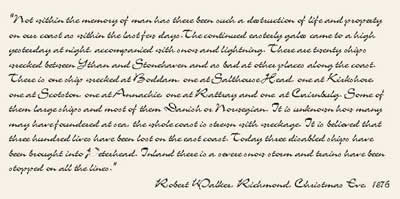The Diary of Robert Walker of Richmond, 1815 - 1890
Diary Extracts Part 2 1867 - 1877
Word Search this page: - PC: Control+F - Mac: Command+F
1867. January 3rd
The "Eclipse" ss launched at Aberdeen.
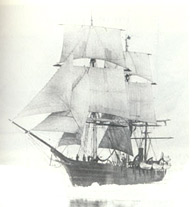 SS "Eclipse" was launched from Hall's yard, Aberdeen, on 3rd
January 1867 at a cost of almost £12,000. Under the command of Captain
David Gray the ship carried eight whale boats and a crew of 55 men. After
a famous career at Peterhead the ship was sold to Dundee in 1893 and later
on to Norway. Renamed "Lomonosov", she ended her ocean going
days as a research vessel under the Russian flag based in Murmansk.
SS "Eclipse" was launched from Hall's yard, Aberdeen, on 3rd
January 1867 at a cost of almost £12,000. Under the command of Captain
David Gray the ship carried eight whale boats and a crew of 55 men. After
a famous career at Peterhead the ship was sold to Dundee in 1893 and later
on to Norway. Renamed "Lomonosov", she ended her ocean going
days as a research vessel under the Russian flag based in Murmansk.
Walker's son Ogilvie served aboard the Eclipse as second engineer in 1870.
1867. June 29th-July 2nd
Excursions
June 29th. To Ballater, Linn of Muick, top of Lochnagar and Castleton.
June 30th. To Loch Callater.
July 1st. To Linn of Dee, Wells of Dee, top of Ben MacDhui, slept at the
Shelter Stone.
July 2nd. To the top of Cairngorm, Loch Morlich, Rothiemurchus and home
by the Speyside Railway.
A keen natural historian with a special interest in botany, Walker made regular excursions to the Grampian Mountains to study the flora of the higher regions. He wrote papers on the subject including an extensive article for the Buchan Field Club, of which he was a founder member, published in the Club's Transactions
1868. September 2nd
This has been the finest harvest I have ever seen and the earliest unless
1826.
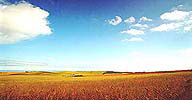 In the hundred years between the middle of the 18th
century and the 19th century nearly every acre of Buchan was brought
under the plough or planted with trees for shelter. The farm tenants
and their families cleared away the stones, levelled the ground and drained
the mosses. They dug miles of ditches and surrounded their new fields
with dryestone dykes. They built a stone house, a byre, a barn and a
stable.
In the hundred years between the middle of the 18th
century and the 19th century nearly every acre of Buchan was brought
under the plough or planted with trees for shelter. The farm tenants
and their families cleared away the stones, levelled the ground and drained
the mosses. They dug miles of ditches and surrounded their new fields
with dryestone dykes. They built a stone house, a byre, a barn and a
stable.
Our ancestors imposed their will on Buchan, and even after another hundred years of fertility the land is kept in trim by unremitting care. If discipline is relaxed for a year or two the land sinks back into its original poverty.
From The Lie of the Land, North East Lowlands of Scotland, J.R. Allen 1950.
Image:Buchan Barley, Protston, Gamrie, 1995 courtesy Neal Murray
1869. August 16th
Marshal Keith monument unveiled by the Earl of Kintore.
 Malcolm II knighted Robert Keith and created him hereditary
Grand Marischal of Scotland after Robert defeated the Danish army under
Camus in the early years of the eleventh century. This high office continued through the family
until 1715.
Malcolm II knighted Robert Keith and created him hereditary
Grand Marischal of Scotland after Robert defeated the Danish army under
Camus in the early years of the eleventh century. This high office continued through the family
until 1715.
The Keiths were Jacobites who, like many others who shared their loyalties, had their land confiscated by the Crown when the Jacobite cause was lost.
Marshal
Keith (James Francis Edward Keith) was born at the family home, Inverugie
Castle, near Peterhead in 1696. A professional soldier, he was forced into
exile for his activities on behalf of the Stuart pretender to the throne
(1715 and 1719). It must be remembered that the Old Pretender, James, chose
Peterhead as his secret port of arrival when he came home to Scotland to
raise an army in December, 1715.
James Keith went on to serve Frederick II as Field-Marshal in the Prussian
army and after a distinguished career, was killed at the Battle of Hochkirken
in 1758. The statue, which stands outside the Old Town House in Peterhead's
Broadgate, was a gift to the town from King William I of Prussia, a copy
of the original which stood in Berlin. James' older brother, George, was
the last of the Keiths to bear the title Earl Marischal.
Image: Field Marshal Kieth looks down on the Broadgate, Peterhead. Washington Wilson Collection courtesy of the University of Aberdeen.
1870. November 30th
A large Prussian steamer with emigrants on Rattray, about 450 passengers
and crew brought to Peterhead.
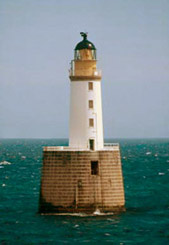 The Franco-Prussian War began in the summer of 1870 and during the months
that followed floods of emigrants left war-torn Europe for North America.
The Franco-Prussian War began in the summer of 1870 and during the months
that followed floods of emigrants left war-torn Europe for North America.
The Ss Union of Breman was heading north through what was then The German Ocean when a storm forced her onto the shores of Rattray Head, just north of Peterhead. The passengers and crew were brought to Peterhead where they stayed for ten days before being taken aboard The Hansa, to continue their voyage to New York.
Through the years hundreds of ships and boats had been wrecked on the Buchan coast, with nowhere to run should the weather break, the busy sea traffic of the day was at the mercy of the elements. The incident involving the Ss Union was one of the many that persuaded the Government that a Harbour of Refuge should be built at Peterhead's South Bay and that a lighthouse should be erected to help ships keep clear of the dangerous rocks and shallows around Rattray Head.
Image: Rattray Head Lighthouse, designed and built by Charles Stevenson in 1895, marks the rocks and shallows off Rattray where so many ships, boats and lives were lost.
1871. August 14th
Centenary of Sir Walter Scott. Great procession of trades etc. in Peterhead.
Aberdeen Free Press, Friday, 18th August, 1871
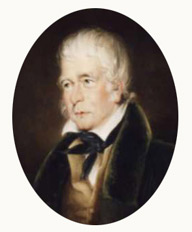 Monday
was a gala day in Peterhead with shops and places of business being closed
at mid-day. At about half-past two the various trades began to assemble
on Broad Street with banners flying and craft insignia borne aloft. With
the Provost in position at the head on horseback, the procession started.
The display was most imposing. The Rifle Volunteers were at the head of
the column with their band; then the Magistrates and Council; then in their
order came Hammermen, Bakers, Slaters, Plasterers, Masons, Fleshers, Ship
Carpenters, Coopers, and mounted Carters, all dressed alike in blue frocks,
at the rear. The procession was fully half a mile in length and there could
not have been much under a thousand in the ranks. In addition to the Magistrates
Dinner which took place at The Inn at five o'clock, a great many of the
separate trades dined together, the fleshers in the Black Bull Inn the
Freemasons in Smith's Inn and the Free Templars had an entertainment of
their own in Broad Place Pavilion.
Monday
was a gala day in Peterhead with shops and places of business being closed
at mid-day. At about half-past two the various trades began to assemble
on Broad Street with banners flying and craft insignia borne aloft. With
the Provost in position at the head on horseback, the procession started.
The display was most imposing. The Rifle Volunteers were at the head of
the column with their band; then the Magistrates and Council; then in their
order came Hammermen, Bakers, Slaters, Plasterers, Masons, Fleshers, Ship
Carpenters, Coopers, and mounted Carters, all dressed alike in blue frocks,
at the rear. The procession was fully half a mile in length and there could
not have been much under a thousand in the ranks. In addition to the Magistrates
Dinner which took place at The Inn at five o'clock, a great many of the
separate trades dined together, the fleshers in the Black Bull Inn the
Freemasons in Smith's Inn and the Free Templars had an entertainment of
their own in Broad Place Pavilion.
A social meeting and ball, under the auspices of the Young Men's Mutual Instruction Society, took place in the Prince Street Hall in the evening. Dr Jamieson presided and, after tea, delivered a most eloquent address on Scott and his works. Several appropriate readings and songs were given and an amateur party played the second act of "Rob Roy." After ten o'clock the hall was cleared for dancing which was kept up right merrily till early in the morning. Altogether, Monday 14th of August was a day to be long remembered in the annals of Peterhead.
Image:Sir Walter Scott - 1771 - 1832. Born in Edinburgh and one of our country's greatest writers. His works are legendary and include the classics Rob Roy (1818), Ivanhoe (1819), Quentin Derward (1823), and Redgauntlet (1824).
1872. July 12th
Foundation stone of the Music Hall laid. Procession and Banquet.
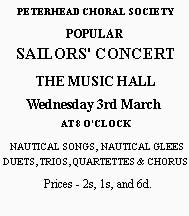 Aberdeen Daily Free Press Saturday, July 13th 1872
Aberdeen Daily Free Press Saturday, July 13th 1872
"Now, gentlemen, this Music Hall I reckon to be not second to any
of the institutions we have ever taken any interest in. I do hope that
you will be enabled to have many a happy and harmonious night's recreation
here, and that music and similar accomplishments will be practised so that
all may be relieved from the toils and worry of daily labour.
Buchan Observer, 1886
I know that many men conscientiously object to, if they do not frown upon
amusements. I think that is a mistake - (hear, hear). Amusements are not
hostile to religion, are not hostile to morality and not hostile to anything
that is good, as many good men have sometimes mistakenly supposed - (applause).
If you don't have innocent amusement for the people they will very often,
too often, find amusements of a very different kind from these. But, mark
you, this hall is not to be a simple place of amusement and recreation.
Its grander uses will be for public instruction, for lectures upon all
kinds of valuable subjects - scientific, literary, and even mechanical."
Thomas
Knox, Preses of the Governors of the Merchant Maiden Hospital
1873. December
2nd
Went to dinner at the opening of the New Hall, Peterhead.
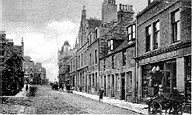 Through its history the Music Hall played host to many popular attractions,
not least the Peterhead Choral Society's performances of a variety of entertainments
including the light operas of Gilbert and Sullivan. With the coming of
cinema the main hall was converted into a Picture House, and later became
a "talkie," while the smaller hall on the ground floor became "The
Empress Dance Hall."
Through its history the Music Hall played host to many popular attractions,
not least the Peterhead Choral Society's performances of a variety of entertainments
including the light operas of Gilbert and Sullivan. With the coming of
cinema the main hall was converted into a Picture House, and later became
a "talkie," while the smaller hall on the ground floor became "The
Empress Dance Hall."
Peterhead Music Hall was destroyed by fire in 1937. Shops now stand where
the first stone was laid.
Image: Marischal Street, late 1800s, Looking eastward, the towering Music Hall can be seen distant right. Courtesy Arbuthnot Museum
1876. August 2nd
Great loss amongst the fishing boats, more than 40 men lost along the coast.
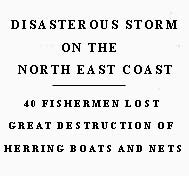 Suffering a poor season at the herring the fishermen were keen to get
back to sea after several days ashore due to bad weather. The weather was
clear and, despite warnings of gales, hundreds of boats, 400 from Peterhead
alone, put to sea. During the night of the 1st and 2nd August a tremendous
gale blew up in the North Sea with disastrous consequences. As the sail
boats made for home the weather worsened still and many boats were broken
and fishermen's lives lost. The great loss of life and property dealt a
devastating blow to the North East community.
Suffering a poor season at the herring the fishermen were keen to get
back to sea after several days ashore due to bad weather. The weather was
clear and, despite warnings of gales, hundreds of boats, 400 from Peterhead
alone, put to sea. During the night of the 1st and 2nd August a tremendous
gale blew up in the North Sea with disastrous consequences. As the sail
boats made for home the weather worsened still and many boats were broken
and fishermen's lives lost. The great loss of life and property dealt a
devastating blow to the North East community.
